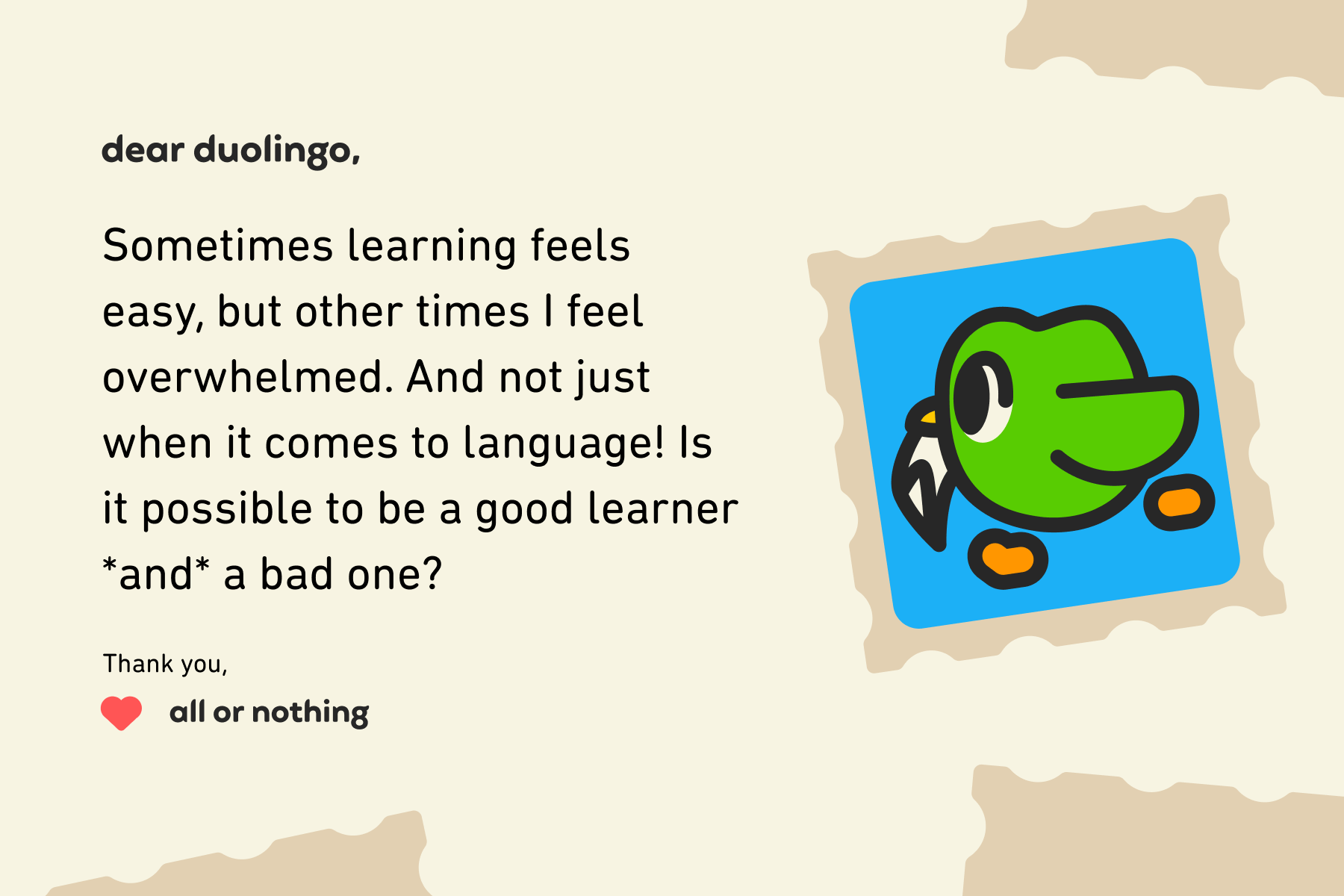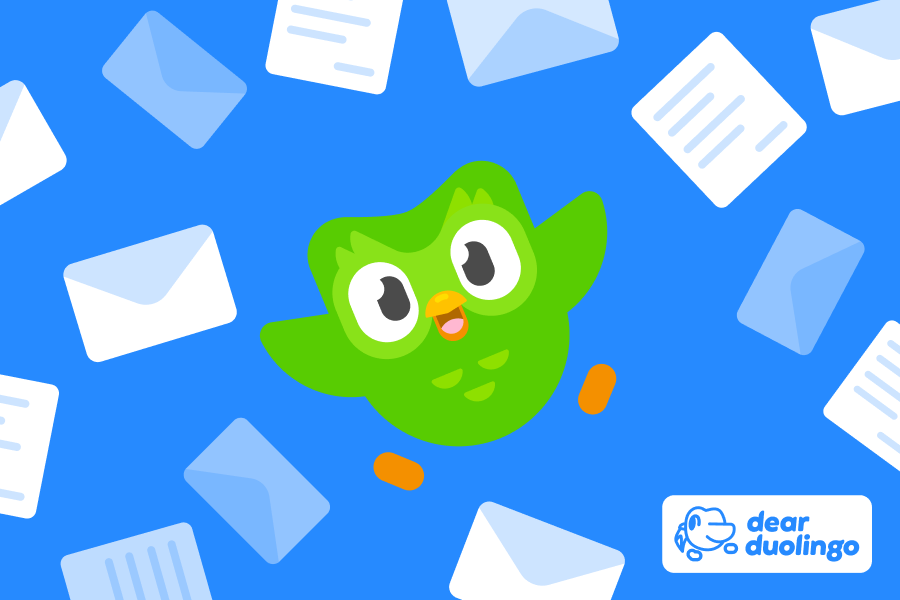Welcome to another week of Dear Duolingo, an advice column just for learners. Catch up on past installments here.
Hi there! This is Elizabeth Onstwedder, back this week to answer another learner question about what has to happen in your brain to successfully learn something. I’ve written before about spaced repetition and why it’s so important for learning—but even with the right kind of repetition, sometimes learning can feel really overwhelming!
Our question this week:

This is a great question for a lot of reasons! We’ve talked before about whether some people are just naturally good at languages, and all that information is relevant for All or Nothing’s question, too.
But today we’re going to look at the other side of things: Instead of focusing on differences between learners (and yes, there are bound to be differences!), we’re going to dive into the stuff being learned. No matter how clever your brain is, some situations, lessons, information, and skills give you a better chance to learn than others.
One major factor is cognitive load—how your brain handles new information given what it knows already, whether it’s the list of relatives coming to your next holiday celebration, the stats for your favorite sports team, or your Duolingo lesson. Here’s how cognitive load can help—or hinder—your learning!
What is cognitive load?
Cognitive load refers to the mental effort needed to process information. For example, trying to understand a complex math concept for the first time will probably require quite a lot of mental effort—it has a high cognitive load. On the other hand, remembering which streaming service has your favorite childhood movie probably has a low cognitive load.
Cognitive load is closely related to the idea of working memory. When you’re trying to process a lot of new information, or information that’s very complex, you have to hold it all in your working memory—which takes a lot of effort. It has a high cognitive load, which can feel just like it sounds: a heavy load that weighs your brain down!
The term cognitive load comes from the work of psychologist John Sweller, who described how limitations of working memory affect learning and problem solving and who also researched how the design of learning materials can help reduce cognitive load. Here are the specifics of how it impacts your learning.
Why is cognitive load important?
Managing cognitive load is essential for effective learning!
If you’re in a learning situation with high cognitive load, you might miss crucial pieces of information or you could draw incorrect connections between pieces of information. You can feel like you’re scrambling to keep track of all the new information that you’re encountering.
On top of this, if the cognitive load is constantly too high, it can be very discouraging: You might lose motivation to keep learning.
That’s one of the reasons your Duolingo lessons are bite-sized—so they are easy to fit into your schedule, and so that the cognitive load of the new information is kept low. We need to find just the right level of difficulty so that you’re not overwhelmed but also not so easy that you’re bored and start to zone out.
When we create new courses or update older ones, we think about cognitive load a lot. For example, in our language lessons, we limit how many brand-new words you see in a single sentence, so that your brain can pay attention to just a couple of new bits of information at a time. Encountering too much new information at once, including language that isn’t tailored to what you already know, is one of the reasons that being immersed in a new language isn’t always an easy learning solution!
Types of cognitive load
Before we get to tips for managing cognitive load, it’s useful to think of three different kinds of cognitive load that you might encounter whenever you are learning something.
Intrinsic cognitive load is cognitive load that’s inherent to the material you’re learning—and it’s unavoidable! For example, in a Duolingo sentence containing a new grammar concept, that new grammar is part of the intrinsic cognitive load of the exercise.
Extraneous cognitive load refers to extra cognitive load that’s unnecessary for learning the new information. For example, if an exercise with the new grammar concept also contains several long and uncommon words, those unnecessarily hard parts add cognitive load that you don’t need to learn the material: Understanding those words likely requires some effort from you, but it isn’t directly related to the core thing the exercise is trying to teach!
Germane cognitive load helps you process information more deeply and leads to better learning. For example, Duolingo doesn’t just show you sentences containing new words and grammar—we make you interact with the exercise, to help you process and learn the information! This adds more cognitive load than just reading sentences with new words, but it’s useful cognitive load since it helps you learn more deeply.
Tips for managing cognitive load
Keeping your overall level of cognitive load manageable is a great way to help your learning—but there are also ways you can think about addressing each kind of cognitive load.
Here are some tips you can use no matter what you’re learning. (And in fact, these are the guidelines that our learning designers use when developing new courses and learning features!)
Ways to manage intrinsic cognitive load
- Instead of trying to learn about a complex topic all at once, break it into smaller, manageable chunks.
- Keep an eye out for useful images, diagrams, or videos that accompany written explanations—these can help you understand the material better.
Ways to limit extraneous cognitive load
- Avoid unnecessary distractions.
- Simplify the presentation of information.
Ways to promote germane cognitive load
- Make sure you’re engaging with the material and are interacting with it, like by organizing your notes, writing summaries, and quizzing yourself.
- Organize what you’re learning in a new way to make deeper connections between ideas.
- Try applying what you know in new settings, like by listening to music or watching TV and movies in your new language.
Lighten your learning load!
No matter what you’re learning, it’s important to find tools and resources that can lighten your cognitive load—and now you have some ideas for taking learning into your own hands!
For more answers to your language and learning questions, get in touch with us by emailing dearduolingo@duolingo.com.
